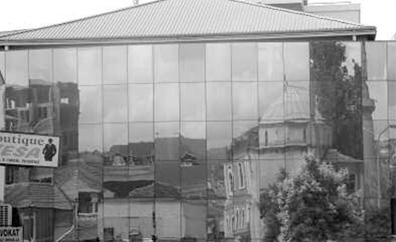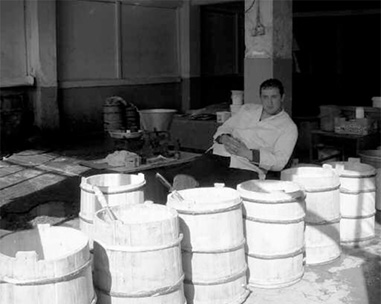A Lone Bee
New Albanian vocabulary: mirëmëngjes (good morning; this was part of Rob’s legacy to me from the language lessons he had had in London before our departure. I asked him to pass on a word a day as my start- ing point in Albanian, which he conscientiously tutored me in as we got up together every morning), shpi (house), ju lutem (please), lirë (cheap)
The Baci Hotel was even more mustard-coloured than its website had led me to imagine. Later, I might have charitably called this a honey tone, but in the dusk our official car pulled up outside what seemed to me to be a building definitely the colour of mustard. I recognised the place from a grainy jpeg image. We were shown up to a mustard- coloured room where the bed had a mustard-coloured nylon eider- down. The sitting area had a mustard-coloured sofa and matching curtains.
The man from Reception set down our luggage and left us.We sat down on the bed and looked at one another. And grinned. It was really happening. This felt like an adventure, whatever the colour scheme.
We were to stay in the mustard hotel for a week while I looked for a home in subtler shades. I had wondered what I would do with myself without a paid job while Rob was at work. This was the first time we had ever been in this situation – I had always worked, and often earned more than him. When he left me my first pile of euros on the bedroom chest of drawers, I was furious.
But I realised my first project had to be house-hunting. It was a project made more complex because I had to try to do it in Albanian. As Rob walked out of our hotel room in the morning I would say goodbye with all kinds of regret. I was losing a friend and ally, but I was also losing the only person I could speak English with.
Until Rob came back from work my day was spent in a strange parlour game of mime and word association. On my first morning alone I went to buy myself a mobile phone (the roaming facility on my British mobile had worked fine all over New Zealand, India, Russia... In Kosovo it would only work in Serbian villages where companies from Serbia had put up phone masts).
I walked carefully through the throbbing, thrilling streets. Pristina sits in a bowl, surrounded by hills, and to the south west, that Plain of Kosovo. It has a creaking power station burning the so-called ‘dirty coal’, lignite. As a result, the air quality is terrible – but, as I would dis- cover that evening, the dust-fragmented light of its sunsets is spectacular.
Concrete towered above me, in quick-fix buildings that were half finished, unrendered, spiky with reinforcing rods. The pavements were almost unwalkable – muddy piles of plastic bottles and other drifts of litter would suddenly mire my shoes, and I was forced into detours by huge holes in the paving, or sewers revealing themselves metres beneath me, where manhole covers had been prised up to be sold as scrap metal. Cars parked anywhere, forcing pedestrians into the streets. And the traffic weaved around it all, cheerfully anarchic. Everywhere there were beautiful, angular young girls in short skirts and low tops, walking in pairs to work or towards the university. They stepped out into the crazy traffic without looking left or right. It seemed they didn’t need to – they were invincible. I had to keep my eyes down, treading carefully in my sensible shoes over the mud with its little square wormholes where the invincible young women had jabbed their confident stiletto heels.

Finally I found a kiosk selling phones. As I walked towards it I looked up in my dictionary the word for ‘cheap’. I practised the sentence under my breath and went in to the phone shop. Painstakingly, I strung the words together. ‘Excuse me, what is most cheap?’ I asked carefully. The shop-owner frowned at me. I repeated myself. ‘Most cheap?’
‘We have no “cheap”,’ he replied, echoing the Albanian word I had used. It was a surprising sales pitch in this rather dirty little space with second hand phones stacked on shelves and the assistant salesman picking his teeth, sitting on a plastic stool covered with a piece of cardboard for padding.
I waved the dictionary at him, wondering whether my pronunciation had been at fault, with all the Albanian ‘q’s that are ‘ch’s and the ‘j’s that are ‘y’s. I pointed at the word I had been using, and as I did so, I noticed the English translation a line above it. With the book jogging under my nose as I walked along the pavement, I had skipped a line. I had not been asking for ‘cheap’ but for ‘cheat’ phones.
I had many similar experiences with the shopkeepers, estate agents, landlords, electricians and everyone else I met in those early days. But all these transactions reinforced that I was really here to stay. Within a week we had a house, and intermittent electricity. With no way back, I realised that I was embarking on more of an arranged marriage than a mere blind date with Kosovo.
So I had better make it work. And I had better make me work. With my experience in education, I was sure that I would be able to find some useful role here. After all, Kosovo has plenty of children – with 25 per cent of the population under 18 it is the youngest country in Europe. I sent out increasingly hyperbolic CVs to new contacts at the Ministry of Education, to local schools – both English-speaking private schools and Albanian-language state schools. I offered training within the education programmes of NGOs, UN agencies, the professional development section of the Kosovo Police Academy. I offered myself as a consultant and as a volunteer. I met for coffee with anyone who was willing to spare me the time. I would sit carefully deploying chunks of my resumé while makiatos steamed on the table, thinking about J Alfred Prufrock and what it meant to have measured out my life with coffee spoons. In between meetings I fretted about the book I had been halfway through writing when the call to Kosovo had come. I had checked that we could have things delivered from Amazon, but I couldn’t build up any enthusiasm for books for research on the library towns and patrons of England when I felt I had just embarked on a multimedia study programme on Kosovo.
And each day when I had worked through my list of contacts to try, and work to chase, I treated myself to sending messages back home, toiling down to the nicotine-rich internet café on Bil Klinton Bulevard.
Most of the road names were simply bewildering to me in those first days, usually being the names of notable Albanians who are less notable outside their native lands. But there were some exceptions to this – for example, Pristina’s main thoroughfare, Mother Theresa Street (she was ethnically an Albanian born in what is now Macedonia), and this main road from the airport that intersects it. Rob pointed out that the location of our house was best described as being at the junction of Mother Theresa and Bill Clinton – a mind-boggling concept.
There is, or was, also a Toni Bler Road, we were proud to be told. Unfortunately, when we subsequently went to find it, we discovered that it had been a minor road in the block of houses now commandeered by the American Office. The paranoid could read something into that.
Bil Klinton Bulevard had been Lenin Street under Communist rule – the name change was just one of the tit-for-tat changes that had been made following the NATO campaign, by a people eager to use every opportunity to remove Serbian fighting heroes from their lives. The road named for the Yugoslav army was similarly changed to KLA Street, after the Kosovo Liberation Army guerrillas who fought the Serbs, and Belgrade Street was renamed Tirana Street to signal a shift in cultural identity from Serbia to Albania. The road names are party political as well as patriotic – incoming mayors find this an economical way to share their values, honour their patrons, repay debts. Since at one point the road names in towns were changing on a nearly annual basis, many people – both native and foreign – gave up on using the road signs, and used landmarks or invented names in conversation; my difficulties in navigating lasted well beyond those first days.
Our new address was in Musine Kokollari Street (ominously named after the Albanian woman who was a teacher and writer but who I was told committed suicide as a result of the poor reception of her work). I had change of address cards printed, and sent to friends and family in the UK. The cards went out signed ‘Bee’. At that point, the only bee in my life was this one, myself, carrying the family nick- name I’d had since childhood, as a result of a babbling younger sister who could only handle the last syllable of my name.
Bees don’t last long if they are isolated from their colony. They can’t collect, store and protect their food stocks alone. By necessity, not just by choice, they are social creatures. If I was to survive, let alone thrive, I needed to work fast to find some points of contact in this con- crete garden I had just flown into.
